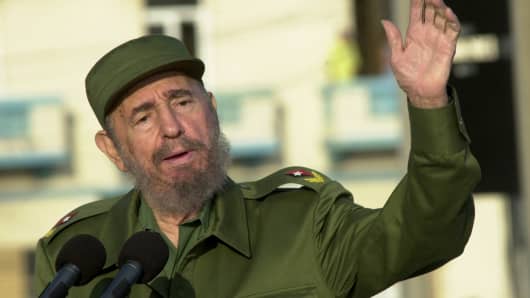The late Cuban dictator Fidel Castro loved baseball, so using a baseball term to describe what his death has provided President-elect Donald Trump: A meatball right over the plate. And not only is the opportunity to start talking tough and actually getting tough on the Cuban regime a home run opportunity for Trump, it's probably a good window to what we can expect from him when it comes to foreign policy for the next four years. The easy-access to the bully pulpit provided to Trump by social media is just too enticing for him to resist.
That became apparent early Monday when Trump followed up his celebratory weekend tweet about Castro's death with another tweet about how his administration will deal with Cuba going forward:
Tweet
At first glance, this might look like something Trump can and will only do in regards to nations like Cuba. After all, the Cuban economy and potential dollar value of the Obama administration deals with the island nation are very small. Politically, Trump talking and dealing tough with Havana is another easy positive for him as it helps him connect deeper with the Florida's Cuban-American voting block that backed him more than expected in the election. And personally, it allows Trump to hurt the established hotel and resorts businesses he's been competing with his entire adult life. Win/Win/Win.
But if we've learned anything from Trump's behavior over the past year at all, it's that he's basically addicted to tweeting blustery thoughts and quasi-threats at will. And that behavior has, as the psychologists say, just been given the most positive and enabling reinforcement there is with Trump's presidential election victory.
Trump's tweeting does indeed allow him to present a very clear and honed message to his supporters and potential supporters at will. Trump is unique in this way. Because while Twitter has been available to President Obama for his entire term in office and was around for decent part of President George W. Bush's tenure in the White House, Trump is the only one who's made it an expected part of his brand.
But this goes beyond a social media platform. Twitter or no Twitter, this is just as much about the no nonsense, strongly worded kind of messaging Trump wants to continue to employ. Diplomacy 101 tells us that's exactly the kind of attitude and public speaking persona that world leaders shouldn't use. But in case you haven't noticed, Trump and most of his more ardent supporters indeed do want to upset the establishment apple cart in almost every way possible.
And almost all of post-World War II American diplomacy is probably as politely establishment as it gets. Trump wants to end the era of tacit and polite respect American presidents and Secretaries of State show to hostile countries and cultures. Images of President Obama bowing low to Saudi kings, his so-called "apology tour" across the world during his first term, and then-Secretary of State Hillary Clinton and some of her female predecessors in that job also agreeing to don Muslim head coverings in public, non-religious places, are just a few examples of things that Trump wants to reverse.



